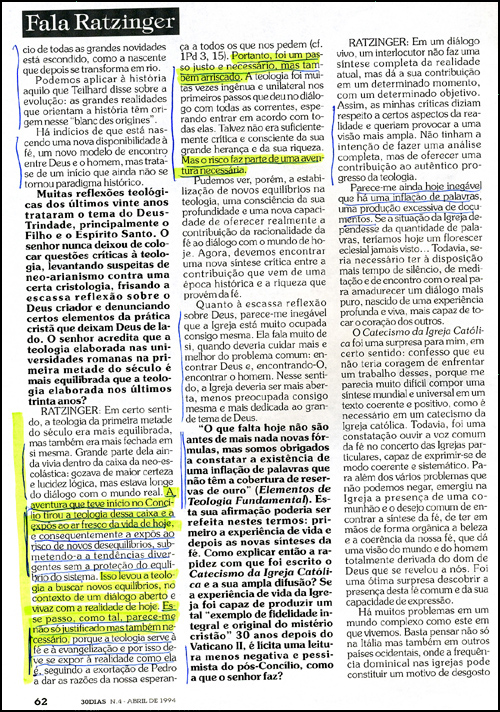In an April 1994 interview with the Italian magazine 30 Giorni, Cardinal Joseph Ratzinger declared that the unbalance, uncertainty, and lack of logic of post-conciliar theology constitute a necessary step for rejecting the Scholastic Theology from the first half of the 20th century.
Ratzinger gives his unequivocal support to that rejection of Scholasticism.
He considered that Scholasticism (thesis) had to generate its own opposition (antithesis) in order to generate a new situation (synthesis), in which the new theology would recover the lacking equilibrium and logic. It seems a clear adhesion to the Hegelian method of analyzing History.
Below right, the cover of 30 Dias (the Portuguese edition of 30 Giorni) where the interview was published. We translated Ratzinger's statements - highlighted in yellow - in the Portuguese text below the translation

|
"In a certain sense, the theology of the first half of the [20th] century was more balanced, but also more closed within itself. Much of that theology lived inside the box of Neo-Scholasticism. It had greater certainty and logical lucidity than today's theology, but it was far removed from the real world. The adventure that began in the Council took theology out of that box and exposed it to the fresh air of today's life.
"Consequently this exposed it to the risk of new unbalances, since it was subject to divergent tendencies without the protection of a system. This caused theology to look for new balances in the context of an open and lively dialogue with today's reality.
"This step seems to me not only justified, but also necessary, because theology should serve faith and evangelization, and, for this reason, must face reality as it is today .... Therefore, it was a just and necessary step, although also a risky one .... But risk is part of a necessary adventure."
(30 Dias, April 1994, p. 62)

|

Posted on August 27, 2005
|
